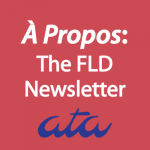

To make our Continuing Education Series Podcast more accessible and searchable for FLD members and the general public, we are now offering transcriptions of our episodes right here on À Propos. Many thanks to our volunteer transcriptionists, who are credited at the bottom of each transcription. If you’re interested in helping us transcribe podcast episodes, email divisionFLD [at] atanet [dot] org.
HOW TO LISTEN TO THE ORIGINAL EPISODE
SOUNDCLOUD: You can listen to or download Episode 20 and all previous episodes on Soundcloud here.
ITUNES: This episode and all previous episodes are available on iTunes here. You can subscribe or listen online. Like what you hear? Rate us and review us! It really helps get the word out.
Episode 20 — Interview with Edward Gauvin, FLD’s Distinguished Speaker at ATA63
Andie Ho: This is Andy Ho, host of the continuing education series, a podcast we produce as a benefit for the members of the French Language Division of the American Translators Association, and those interested in becoming members. This series strives to offer educational content about the craft of French to English and English to French translation, and about our division. In today’s episode, it is my pleasure to welcome Edward Gauvin, our special guest and distinguished speaker for #ATA63, the conference in Los Angeles this fall. Edward is a writer, translator, and independent scholar. His work has been shortlisted and nominated for a multitude of prizes, and he has received grants and fellowships from around the world. Most relevant to the FLD and ATA, he has contributed over 100 translations to various journals, anthologies and collections and translated over 400 graphic novels. He also publishes his own original fiction, some of which he has translated in French. Welcome, Edward! It’s a pleasure having you here today.
Edward Gauvin: Thank you so much. It’s a pleasure to be here, Andy, and I’m really looking forward to the October conference.
Andie Ho: So, you have a very wide-ranging career. Can you tell us how you got started and branched out into all those different fields?
Edward Gauvin: Well, I got my start as a translator in the mid-2000s. I had come back from teaching as a lecturer as a freshman and sophomore in college in France. And for some reason, I thought translation was something one could do. I don’t think I had a particularly timely notion of that. I think for some reason I was thinking that you could translate pulp novels and other things that don’t get published in the US. I’m not sure, I had those very outdated notions…
However, I was hanging around Comic Cons. And in the New York Comic Con, I believe it was in 2005 or 2006, the very first one, and there were smaller fairs as well… I was hanging around those and trying to interest editors and publishers in comics/graphic novels that I had liked in France. And so, none of those pitches ever worked. But I think I sort of just got my face in their face, so that was how I wound up with my first few jobs.
Around the same time, in 2005, Words Without Borders published my first short fiction translation by Georges-Olivier Châteaureynaud. And I wound up working on his stories for the next couple of years, and then putting out my first full-length prose fiction translation in 2010, which is a volume of his selected stories. So, I think my career has pretty much proceeded along those twin tracks right from the beginning and ever since.
Andie Ho: Well, I had never heard of Words Without Borders and so I was looking into your background… Can you tell me more about what they do?
Edward Gauvin: So, when I first published with them in 2005, they’d only been around for two years, and … they were the first—and I would say now still the biggest—periodical that is devoted entirely to international literature in English translation. Now, the translation scene has changed so much and literary translation has become a lot hipper than it used to be. But Words Without Borders was into translation before translation was cool!
But seriously. They recently went through a major site revamp. So that’s been overhauled, and the look has been greatly streamlined. They’re still adding the archives in. But I think they’ve published from almost 150 countries, just as many languages. And I think… I’ve sort of watched from distance as their editorial priorities have shifted over time as well.
Among the founding members were a former editor for foreign literature from Northwestern, another from Norton [W.W. Norton & Co.] and another who worked with Zoetrope, the American fiction magazine. And one of their neatest programs, one of the coolest things that they sort of grew into over the years is something called WWB campus, or Words Without Borders Campus. It actively designs classroom modules and teaching aids for people who want to… It provides educator support and supplemental curricular resources, and it also tries to get even virtual events or in-person events where translators and authors can visit classrooms at any level from college and younger.
I think more recently, a lot of their claim to fame has been publishing as well, authors that have gone into major, major awards, like Elena Ferrante, or Han Kang, or Olga Tokarczuk. These are people who were first featured in their pages before they won Bookers and Nobels and things. So, I think it’s been a really big force for international literature in the US. I think the reason that they went online, they were a little ahead of the curve in that way, but also it has allowed them to keep overhead down in a way that print magazines aren’t able to. This is perhaps of the most interest to people who are looking to get into literary translation. Most of the time, the periodical scene is so small—if you’re talking about lib mags and university journals, etc.—that the onus of clearing rights is pushed onto the translator, which isn’t completely fair. When you’re actually publishing, it’s an editor agent’s job, or a foreign rights department’s job. But Words Without Borders has always taken that onto themselves. And right from the start, they have always paid the translator AND the author. And this isn’t something that a lot of periodicals, even now, can claim.
Andie Ho: Wow, alright! You’re talking about Elena Ferrante and Olga (I don’t know how to say her last name), but we can also go back to, say, Steve Larsen. So, the number that gets quoted a lot is 3%, right, that only 3% of literature gets translated into English. I forget what exactly it is. Do you think that has changed in recent years?
Edward Gauvin: OK, just to clarify… It’s not 3% of the world’s literature that gets translated into English. It’s that of the books published yearly in English every year, only 3% are devoted to translated literature. I am not plugged into BookScan enough to tell you what it is now and Chad Post has started his Three Percent blog post out of Rochester in 2008 or 2009. I will tell you that my sense is that it has fluctuated and it has grown and remains on the side of growth, but that I would be surprised if it has doubled. I would say that it stayed somewhere between three and six—and that’s a completely off-the-cuff thing—if it had doubled, I would be surprised if it had doubled and stayed there for more than a year. Because, as I have mentioned, there are a lot of fluctuations.
And I would say, for me there are a couple different parts to that. Yes, the literary translation scene has massively diversified in terms of the numbers of publishers. But these are mostly small presses, not even imprints of large presses. That’s how art moves forward, really, historically. But I think that there has been a shift in the kinds of things we look to foreign literature for, and there’s still a raging debate as to whether it actually sells. And there are always going to be exceptions that sell extremely well, but then become unfortunately sort of synecdochic of the entire phenomenon, which doesn’t sell as well.
I think I’ve wandered off a little bit at the end, but there’s definitely not progress in the numbers. Far greater than progress in actual numbers is greater cultural awareness. I think that has risen in a way that’s faster than the economic side of things.
Andie Ho: So, in recent years, there’s been a lot of interest in foreign media, with K-pop, Parasite and other Korean movies… I think just a lot more interest in Lupin, the TV series on Netflix… Do you think that there is, in general, some sort of expansion of interest into foreign media that will, in a sense, like “rising tides lift all boats,” that will affect translation of books, or not so much?
Edward Gauvin: I think for me there’s a couple issues all knotted up in there, so please catch me out if I start to prattle on. One is that interest in translated books does not necessarily equate to better pay or living conditions for translators. And so, I think the same thing applies here. The interest in foreign media also may not directly improve the translators’ or subtitlers’ lot. And I think that’s because … people have a very dated idea of what translation is, does, or should do, or can get away with, or the degree to which it can transform something. That’s something that I think about a lot.
I think the other difference is just [that] books are such a small part financially of media as a whole that foreign media becoming more popular or not… Things operate differently at different scales of how much money is involved. I guess this is what I’m trying to get around to. So, for instance, the recent Brad Pit’s Bullet Train is based on a Japanese novel that I remember reading articles about when the Japanese novel was first snatched up (it was probably in Hollywood Reporter or something) by Pitt’s production company. There hasn’t actually been a whole lot of discourse concerning Bullet Train about how the entire cast is now while, pretty much, and that’s fine. That’s one issue. But the other issue I remember reading in Hollywood Reporter, when the novel was first snatched up, [is] that the novel was one of the properties that a newly founded firm in Japan had shopped around, and this firm was dedicated toward getting more Japanese properties sold abroad. Whether it be for remakes or adaptations or anything, they just wanted to push it… And I don’t think of Japan as a country that is massively underrepresented in terms of international media presence. And yet, when you hear the founders of the company speak, they were talking of untold troves of material in Japan that they were sure would interest other people, but not enough people read Japanese to access it. It just wasn’t known. And so, I wonder to some extent how many places feel like that. If Japan, which I think of as having a major media presence already, feels like that, then, how much are other places going to feel like that?
My third sort of related point is that I actually find the subtitling scene really, really, really interesting for its crossover with literary translation and mostly from an underrepresentation of labor point of view. Subtitles have been popping up more and more into the news lately. And every time it does, it really just perks up my ears, because one of my ongoing thoughts of experiments is to see how many other disciplines under some disciplines have some kind of labor or historical or metaphorical overlap with translation. The most recent subtitling story I remember seeing was about Stranger Things, and how the subtitles are really kind of “juicy” and reach for the not obvious adjectives and how that enhanced the experience. And that’s all fascinating to me. How can that happen in translation? The other one, of course, was with the Korean property… I’m going to blank on the name now, the one with the game show where they kill people…
Andie Ho: Squid Game?
Edward Gauvin: Yes, thank you. Well, I did see it and there was a little brouhaha… There was a New York-based Korean American writer who was tweeting about how the subtitles were off, and how there actually turned out to be two sets of subtitles: one for the closed captioning, and one that actually looks more sort of human translated. But I remember one of the things that this person said was, “If you watch the show with this set of subtitles, you’re not getting the same show.” And like, this was sort of the foundation of some kind of notion of betrayal, right? And this is something that I think translators might be working to push, if not entirely overthrow, because for me that’s a given. That’s kind of like “Duh!” That’s where literary translators start right now. Yes, of course, it’s not the same. You shouldn’t think of them as the same. You shouldn’t think that you’re able to get the same out of this transaction. That’s just my bringing it around to translators versus translation again.
Andie Ho: You bring up some really good points about the devaluation, I think, of translators. Do you have the same problem in literary translation, that there is a sense that anybody who speaks a second language can translate it? Is that prevalent in publishing?
Edward Gauvin: I do think a lot of translators—because I’ve heard variations on this—think of editors as having a tin ear, or that editors do think of translators as interchangeable. Or that editors are kind of like this tone-deaf conductor that the translator has to teach how to… Or rather, if the translator’s a conductor, that as a conductor, we have to educate the editor in how to appreciate the difference between one conductor and another.
It’s hard for me to assess literary translations, the attitude of literary translators as a whole. I don’t feel that connected with the scene anymore, and… What I’m judging it on these days is based on things I read, and things I read can be all over the map. Like, sometimes translators will say things that sound the same as what translators said 60 years ago, and other times translators will have fairly progressive views, deeply informed by translation studies or comparative literature or some background in academic theory, so it’s really hard for me to say as a whole what the community thinks. I do think that by and large, it’s moved beyond the issues of authorial fidelity, which is not something the world has moved out from. Because, you know, translators will say one thing at a convention, and then when one of them gets profiled in the New York Times, what emerges in the article at the end of whatever process goes on is pretty tame compared to what goes on at say, a convention or a conference or a round table.
Andie Ho: [Laughter] So, for the real deal, you have to go to a translation conference and see what translators are talking about.
Edward Gauvin: Yes, well, the literature is out there, you know. Do some digging. But even in, like, a literary translation Facebook group, especially if you are getting people who are translating out of English… I would say that how translators feel about what it is they should or shouldn’t do runs a pretty broad gamut. I should also contextualize almost everything I’m saying as coming out of specifically an into-English scene.
Andie Ho: Yeah, which… I don’t want to presuppose anything. Do you feel like the into-English scene translations are sort of watered down a bit, or not watered down … made more palatable for local audiences?
Edward Gauvin: Yeah, well, that actually is the crux of Lawrence Venuti’s original Translator’s Invisibility diatribe, right? I mean, he wasn’t blaming the translators in that case, he was blaming the publishing industry as a whole. But I think the translator’s invisibility as a phrase has kind of gotten dislocated from his originally coinage and is sort of just generally used to apply to… It applies probably more often to lack of cultural capital or lack of actual economical capital. But originally, his argument was rooted in a fairly specific reading of how certain marks of foreignness would get ironed out into a more standardized English. I don’t honestly have the time to read widely enough to assess that right now. I don’t know. Yeah, honestly, I can’t.
I also do think that the old binary that sets up, right, because that’s the other bastardization of Venuti’s idea, is that, “Oh, it’s either about foreignization or about domesticization, and if we’re going to foreignize things, we’re going to leave weird turns of phrase and foreign things in there,” and that’s definitely not what you’re saying. But that’s an easy straw man to attack him, but also to attack schools of translation. A lot of translators also use it. They say, “I don’t foreignize. I’ve never foreignized. Foreignizing is stupid.” But it’s only stupid if you define it very narrowly like that. I do think that binary is maybe also something that needs to be gotten out of…
Maybe this will segue back to comics. For me, with comics, someone asked me that at an event that I did in Pittsburgh at the City of Asylum… and I really fumbled the answer because it was at the end of the night. But… I do think that issues of reception in general have been neglected in translation. Which is to say that in translation, you’re talking about how it’s usually, “Are you close to the author?” or “Are you close to the original language?” or something like that. But are you making something for a specific readership in the US, and what does that entail? And in that case, this is something that comics speaks to very much, right? If I do a French Western, they’re never going to have a “howdy” in. But I’m going to put a howdy in the English version. There’s a way “Westerns” sound. There is a way “noir” sounds. And also, there is a way “noir” sounds, in fact, that is informed both by American pulp writers and French new wave directors who loved American pulp writers, and then American pulp writers who loved French new wave movies. There’s already a dialogue going. There is no purity. So, when I talk about audience reception and expectations deservedly going into the translation, it’s not just the author speaking through you, it’s not the language speaking through you, it’s also the genre speaking through you, the affectations speaking through you and informing your work.
Andie Ho: Fair enough! I don’t want to spoil too much of your sessions, so I’m going to cut you off here. But is there anything else you would like to say for our audiences?
Edward Gauvin: Yeah, I think one of the original questions was just about some practical advice on trying to break into translating comics. This is a question I get a lot from literary translators. People should just remember that comics is still an artist’s medium and not a writer’s, such that if you’re pitching a comic, I think you should be aware that it will be bought primarily on art and perhaps before even stories. Art is going to edge out subject matter, even. So, yeah, I think that’s something people don’t think of, especially as translators, since they’re focused on the words.
Andie Ho: Well, thank you very much for your time today, Edward. I can’t wait to meet you in person in LA.
Edward Gauvin: Yeah, I’m looking forward to it! I hope [the] BA.5 [subvariant] allows it nevertheless to be a safer event for all concerned.
Andie Ho: All fingers, toes, limbs, everything crossed. For sure. Alright, well, thank you very much!
This concludes our episode for today. You can subscribe to the continuing education series podcast on SoundCloud at soundcloud.com/ATA/FLD or on iTunes by searching for “continuing education series” in the iTunes store. You can contact the FLD at divisionfld [at] atanet [dot] org, visit our website at ata-divisions.org/FLD or get in touch with us on social media. This is handy Andy Ho, signing off. Thanks for listening and à bientôt!
Edward Gauvin is a 2021 Guggenheim fellow and award-winning translator. He has received grants and residencies from the National Endowment for the Arts, PEN America, the Fulbright program, Ledig House, the Lannan Foundation, the Banff Centre, and the French and Belgian governments. His work has appeared in The New York Times, Harper’s, The Guardian, and World Literature Today. As a translation advocate, he has written widely, spoken at universities and festivals, and taught at the Bread Loaf Translation Conference. The translator of over 400 graphic novels, he is a contributing editor for comics at Words Without Borders.
ATA Podcast host Andie Ho is a certified French to English translator specializing in the food industry. She earned her M.A. in translation from Kent State University and is now based in the Houston area. She currently serves as the ATA’s French Language Division administrator. You can follow her on Twitter at @JHawkTranslator or email her at andie [at] andiehotranslations [dot] com.
Transcribed by Isabelle Berquin, PhD, CT. She is an ATA-certified English <> French freelance translator specializing in the life sciences and medicine. A native speaker of French from Belgium, she has a BS in biology and a PhD in cancer biology. Her favorite translation projects are those that allow her to leverage her 20-year experience in biomedical research. She has been living in the USA since 1990. In her spare time, she enjoys reading, going on nature walks, gardening, painting, printmaking, cooking and singing. Find her online here.


